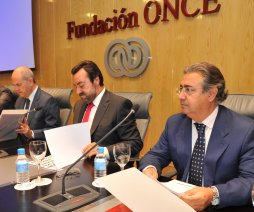
FEDERACION ESPAÑOLA DE MUNICIPIOS Y PROVINCIAS
- Contact |
- Who are we? |
- Site Map |
- Job offers
Juan Ignacio Zoido affirms the commitment of universal accessibility FEMP
The boost in the municipalities FEMP policies that favor the elimination of all barriers and promote the awareness and involvement of politicians and technicians to advance universal accessibility. This has been expressed in the President of the FEMP, Juan Ignacio Zoido, while presenting the first report on Universal Accessibility in the municipalities of Spain 2011, prepared by the ONCE Foundation.
Zoido intervened along with the Deputy Prime Minister of Territorial Policy, Manuel Chaves, and the President of the ONCE and its Foundation, Miguel Carballeda.
The "universal accessibility" and "design for all" have to take a leading role in local public policy, as stated by the President of the FEMP-so that people can enjoy a life "fully independent" in some cities becoming more human and liveable, because "sometimes we do not realize, 'he said two inches of difference for some may be an impossible barrier to overcome." Therefore, "we have to look at the city from the perspective of those most in need."
Juan Ignacio Zoido said that through this work will be known photograph of our cities in terms of accessibility, "which will help us take another step forward" in policies, programs and actions promoting equal opportunities and promote inclusion social integration of people with the greatest difficulty. "Mayors know that accessibility is synonymous with health, safety and welfare," said the mayor of Seville.
The Universal Accessibility Observatory in the Spanish municipalities is driven by the ONCE Foundation and has the support of FEMP, and IMSERSO CERMI.
The crisis is no excuse
The Deputy Prime Minister of Planning Policy said that recognizing the rights of disabled people is "righteousness" and that the crisis "can not be an excuse" to go back in social policies. The study stressed that serves for all the heads of government "become aware" of the need to promote measures to ensure equality for all.
"We are more dignified and more just when you do not limit the rights of citizens," he said Manuel Chaves, who also reviewed the progress on disability. As noted, despite the difficulties, the care for people with disabilities has continued to occupy a prominent place in the government's agenda. "We have made progress but much remains to do," he acknowledged. "It is unfinished task for the environments are becoming more accessible, more human and participatory," he concluded.
For his part, Miguel Carballeda referred to the challenge of achieving a Europe without barriers. To do so, he warned, we must begin by designing towns and cities for all. "We must continue working hard to eliminate all barriers." In doing so, the president of the Foundation ONCE and reiterated the need to restore the partnership between public authorities.
The study
The ONCE Foundation report presents the results of a study conducted in 70 municipalities, which have assessed the degree of accessibility of their Web sites, urban areas, buildings and transport.
The main conclusion is that there are multiple and various breaks in the chain accessibility in the more than 254 kilometers of road tested. Added to this is that often does not respect the current regulations of accessibility both in the old town areas, as newly constructed or rehabilitated.
In the comparison between municipalities no significant differences are roughly according to size. In this sense, the text states that the application of existing legislation is not related to having more or fewer economic resources or the size of the municipality, but with sensitivity and willingness of politicians and technicians who design and supervise the actions to be taken in the urban environment.


